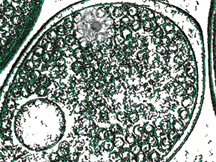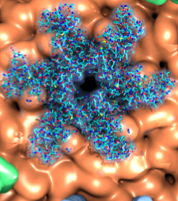The hyperactivity of RAS proteins is associated with tumor progression, invasion, and metastasis in many forms of cancer. RAS proteins must directly interact with the membrane to activate their signaling targets, but the complexity and dynamics of such interactions continue to defy experimental characterization. In a multi-institute collaboration, combining NMR with multi-μs MD simulations with NAMD, and neutron reflectometry, we developed for the first time how a membrane-binding protein domain interacts with and penetrates the surface of the cell at full atomic detail. Analysis of the simulations in VMD revealed that the protein adopts multiple forms on the membrane in a lipid-dependent manner. More details can be found in a recent publication in Nature Communications.
The Future of Biomolecular Modeling
A 2015 TCBG Symposium brought together scientists from across the Midwest to brainstorm about what's on the horizon for computational modeling. See a summary of what these experts foresee.
Read more
A Look Ahead
The Urbana NIH Center previews what it will propose for the 2017-2022 funding cycle. By Lisa Pollack.
Read more
Announcements
Tajkhorshid receives Beckman Institute Vision and Spirit AwardElectrified PeptidesResearch Programmer PositionAI and Molecular Sciences
Seminars
Remembering Klaus Schulten
Recent Publications All Publications
- Beyond nothingness in the formation and functional relevance of voids in polymer films. Nat. Commun., 15:2852. 2024.
- Structure of alpha-synuclein fibrils derived from human Lewy body dementia tissue. Nat. Commun., 15:2750. 2024.
- Generating Concentration Gradients Across Membranes for Molecular Dynamics Simulations of Periodic Systems. Int. J. Mol. Sci., 25:3616. 2024.
- IHMCIF: An Extension of the PDBx/mmCIF Data Standard for Integrative Structure Determination Methods. J. Mol. Biol., 18:168546. 2024.
- Elucidating the Mechanism of Metabolism of Cannabichromene by Human Cytochrome P450s. J. Nat. Prod., 2024.
- WSB1/2 target chromatin-bound lysine-methylated RelA for proteasomal degradation and NF-κB termination. Nucleic Acids Res., gkae161. 2024.
- Tumor-acquired somatic mutation affects conformation to abolish ABCG2-mediated drug resistance. Drug Resist. Updat., 73:101066. 2024.
Highly Cited
Self-organizing maps: Ordering, convergence properties and energy functions. Biological Cybernetics, 67:47-55, 1992.
Click here for other highly cited papers
Click here for other highly cited papers







